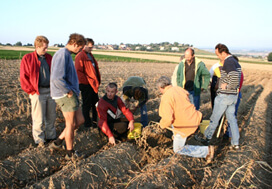
Damian Maye has had a paper accepted for publication in Sociologia Ruralis.
The paper comes from research conducted as part of an EU 7th Framework project called SOLINSA, which identified effective and efficient approaches for the support of innovation for sustainable agriculture and rural development.
This paper applies the transitions approach to a novel food production context, via an examination of the food production side of permaculture. More specifically, it examines attempts by the permaculture community in England to interact and influence the Agriculture Knowledge System of the mainstream agri-food regime.
Strategic Niche Management and Communities of Practice theory are combined to examine the ways in which the permaculture community has evolved and has sought to develop its agro-ecology message and influence the agri-food regime. Evidence of second order learning and networking with stakeholders outside the community of practice is limited. A tension between internal activities that reinforce a boundary between the permaculture knowledge system and the wider Agriculture Knowledge System are evident. Some external activities designed to cross boundaries are noted. However, activities designed to translate permaculture ideas into mainstream agriculture have had limited success. There is some evidence of interaction and lateral linkage with sub-regimes to enhance capacity but this is usually in individual capacities. Examining the evolution of radical niche innovations such as permaculture thus reveals the way that beliefs, values and epistemologies make the process of sustainability transition challenging and complex, particularly when different knowledge systems clash with one another.
The reference of the paper is below and will be updated on Damian’s staff page and the UoG research repository once it is published.
Maye, D. (2016 in press) Examining innovation for sustainability from the bottom up: An analysis of the permaculture community in England. Sociologia Ruralis.




